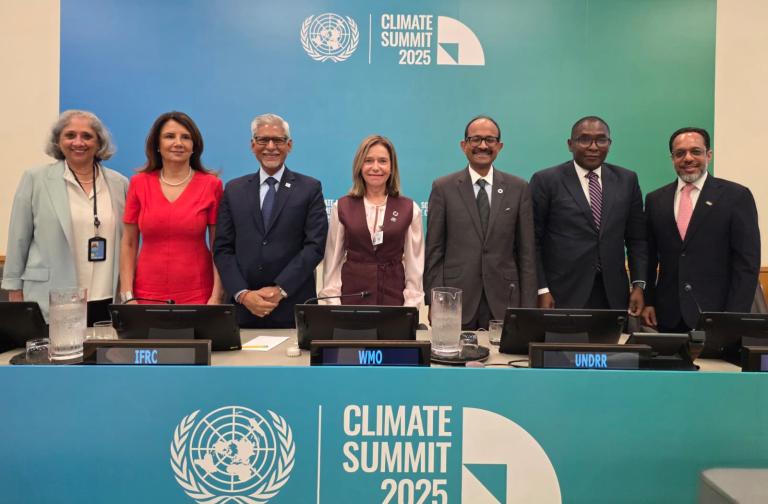United Nations General Assembly marks 80th anniversary, whilst WMO celebrates 75 years of Science for Action.
The vital contribution of the World Meteorological Organization to global well-being and security will be highlighted this week at the annual session of the United Nations General Assembly, which marks the UN's 80th anniversary under the rallying call of Better Together.
"Over the last 80 years, the UN has led the way to some of humanity's greatest triumphs," said UN Secretary-General António Guterres, urging leaders to move forward with clarity, courage and conviction. "We must not only defend the UN, but strengthen it," he emphasized.
WMO Secretary-General Celeste Saulo kicked off her packed schedule with a High-Level Solutions dialogue on Accelerating Early Warning and Extreme Heat Solutions. It brought together a diverse group of ministers, mayors, philanthropic organizations, scientists and civil society.
The event highlighted the need for increased financing, inclusive partnerships, technological innovation, and intentional action to protect vulnerable communities worldwide. The outcomes and recommendations will inform the UN Secretary-General's Climate Summit on 24 September.
"We are here today for one urgent and unifying purpose: solutions," said Celeste Saulo. "Solutions that turn science into decisions, transform warnings into action, build long-term resilience, and that are based on data sharing and trust," she said.
"We have good news and can report progress. Quite simply, early warnings are saving lives," she said. Early Warnings for All is no longer just an initiative. It is a brand - a global movement," Celeste Saulo told the high-level dialogue, convened by Selwin Hart, Special Adviser to the Secretary-General on Climate Action and Just Transition.
The United Nations Secretary-General's Early Warnings for All (EW4ALL) initiative aims to ensure every person on Earth is protected by early warning systems by 2027. With two years remaining to meet this goal, it is critical to accelerate progress on all fronts.
This requires technology to bridge the digital divide, high level political support, embracing a whole-of-society approach, and prioritizing the most vulnerable sectors of society and the most extreme hazards, said Kamal Kishore, the Special Representative of the Secretary-General for Disaster Risk Reduction.
There is progress:
More than 60 percent of countries now report having Multi-Hazard early warning systems.
Least developed countries are making strides and have doubled capacity since official reporting began.
The statistics speak for themselves.
- Disaster-related mortality is at least six times lower in countries with good early warning systems.
- Just 24 hours notice of a hazardous event can reduce damage by up to 30%.
- From 2015-2022, 2.1 billion people were evacuated in advance thanks to early warning systems.
- Heat-health action plans are helping us prepare and respond, protecting millions of people all over the world.

Extreme Heat
But much more remains to be done - especially on one of the deadliest hazards - extreme heat.
Temperatures above 4O°C - even above 50°C - are becoming more common, with cascading effects on health, water and food resources, labor productivity, and energy and transport systems.
The UN Secretary-General's Call to Action on Extreme Heat has heightened awareness and boosted investment. But there is a need to break siloes at all levels and across all sectors to accelerate delivery.
The Solutions Dialogue examined a three-pronged approach covering emission reductions and mitigation; redesign of urban centers and facilities; and systemic governance responses, including integrated decision-making, heat action planning and investment informed by hazard science and early warning systems.
A combination of local action and a collective global response is necessary to beat the heat, said Jagan Chapagan, Secretary-General of the International Federation of Red Cross and Red Crescent Societies - one of the partners in EW4All.
According to WHO and WMO estimates, scaling up heat health warning systems in just 57 countries could save nearly 100,000 lives every year. This is why the WHO-WMO Joint Office on Climate and Health are working with partners such as Rockefeller Foundation and Wellcome to target extreme heat.
Moving forward, Celeste Saulo called for commitment to three essential actions:
- Scale up financing for early warning systems. This is not a cost but an investment.
- Integrate early warning systems into all Nationally Determined Contributions and national adaptation plans.
- Strengthen cross-sector collaboration to reach the last mile to ensure no one is left behind.
The Solutions Dialogue will seek to Identify concrete, high-impact solutions ahead of COP30 in Belém, Brazil, and mobilize political and institutional momentum to accelerate action on EW4All toward 2027.
The outcomes will be reported at a Special High-Level Event on Climate Action on 24 September 2025, as a platform for leaders to present their new Nationally Determined Contributions (NDCs).
By COP30, all Parties to the Paris Agreement must submit new Nationally Determined Contributions (NDCs) that reflect bold action for the next decade. These updated plans are a chance to unlock the benefits of a just, resilient, low-carbon future.






